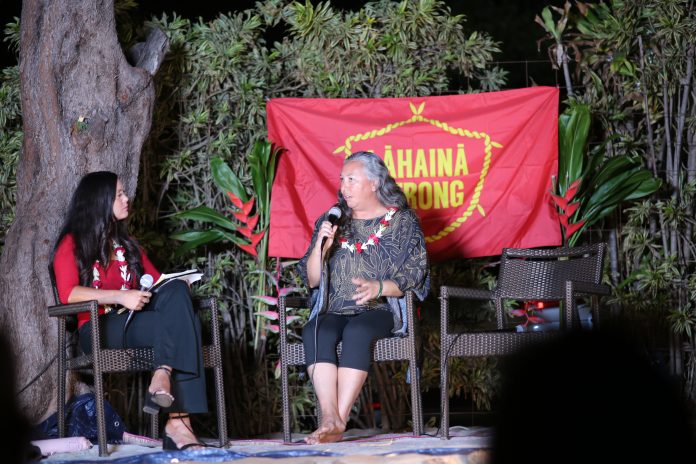By Yiming Fu, Report for America corps member
This election, Maui residents can vote for affordable housing plans, innovative solutions for the island’s water crisis and fire recovery policies that put locals first. All county council members are up for election, and residents can vote in all races, regardless of which district they live in. Early voting began October 22.
At a Lahaina Strong candidate forum October 7, 2024 at Hanakao’o Beach Park, the candidates were asked three questions on the future of West Maui, covering topics including high quality recycled or R-1 water, converting short term rentals into long term housing units and other ways to better support unhoused people. Here is what they had to say:
Wailuku – Waihe’e – Waikapu
Incumbent Alice Lee and challenger James Forrest discussed affordable housing, pesticide usage and water usage that respects the natural ecosystem.
Alice Lee
Lee said most people misunderstand the council’s role as building homes. They can only approve policies. She said the public under-appreciates the county’s hard work on creating affordable housing policies because they do not have their own PR people.
As an example for affordable housing policies, Lee pointed to the Ohana Assistance Program, passed in July to provide grants of up to $100,000 for homeowners to construct attached or detached ‘ohana units to their homes.
“It’s all long term rentals at an affordable rate,” Lee said.
When asked about Bill 99, a controversial bill she signed to allow pesticides again on county lands, Lee justified her stance saying 1,200 people signed a petition complaining about the new substance used to replace pesticides.
When asked how she would balance building and maintaining the health of Maui’s ecosystem, Lee said she supports using R-1 water to free up potable water for other uses. R-1 water is recycled wastewater that can be used for agriculture and construction but is not suitable for drinking.
James Forrest
To address affordable housing, Forrest would like to increase property taxes on hotels and give that money to the affordable housing fund.
“They’re benefitting the most from the resources of the island, but they’re not actually paying it back enough.
Forrest said he cares about restoring land and restoring water and would never advocate for pesticide usage. He said he has experience working in soil remediation and regenerative farming on Maui’s sunflower farm in Maalaea, making him the most environmentally friendly council pick.
The challenger wants to limit water to hotels and wants to create a water authority to put water in local hands. Lee has voted against a water authority every time.
Forrest also said he is against the Ledcor development, a developing company that plans to build 975 mostly-luxury homes in South Maui. Honolulu Civil Beat reported that Ledcor anticipates about 90% of its market-rate units would be used by people who live part-time on Maui and 10% would serve full-time residents.
“Ledcor has donated to my opponent’s campaign last year and this year,” Forrest said. “What you’re going to get from me is a situation where Ledcor is never going to come to our island.”
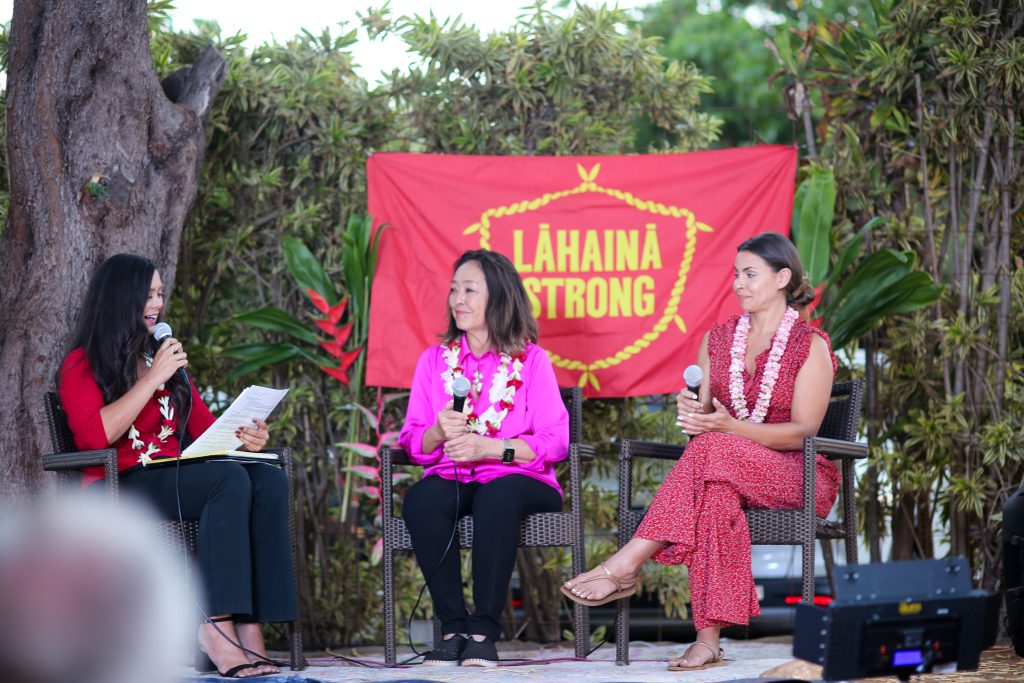
Upcountry
Incumbent Yuki Lei Sugimura and challenger Jocelyn Cruz discussed converting short term rentals into long term housing, finding ways to help local families maintain their property and the usage of injection wells.
Yuki Lei Sugimura
When asked if she would support raising taxes on non-owner occupied or vacant homes to aid Lahaina’s recovery, Sugimura said Maui already has a tax on non-owner homes. To tackle other housing problems, Sugimura said Maui needs to look at the island’s 7,000 short-term vacation rentals. The council is currently looking at a bill that would transition these short-term rentals into long-term housing.
“We have asked for information on a report that we should get ending at the year so we can get all the data so we understand what are we really talking about,” Sugimura said.
When asked how important it is to her that Lahaina stays in local hands, Sugimura said the council gave millions of dollars to the Lahaina Foundation to protect Maui from outside investors and did everything they could to put money toward housing.
“We need to buy the land back and keep it in Lahaina hands.”
Sugimura said the county will listen to the EPA on injection wells, which are vertical pipes placed directly in the ground to get rid of excess wastewater. Maui has 18 injection wells, and EPA studies show Lahaina’s four injection wells are killing off coral reefs and harming the ocean. While injection wells are used elsewhere, they are used more frequently on Maui to get rid of water that doesn’t meet clean drinking standards.
Jocelyn Cruz
Cruz said she spoke with an economist and found Maui has some of the lowest tax rates in the world. She said she supports a vacant property tax and wants to look into the zoning of short term rentals to use those spaces for the community.
To help local families stay on the island, Cruz said she would support Lahaina Strong in every way and listen to their plans.
When asked how she would prioritize ending the reliance on injection wells to get rid of excess wastewater, Cruz said the county should make hotels pay for a safe way to dispose of their water and use more recycled water. She also said we need potable water for affordable housing for local residents. Hotel golf courses use up to a million gallons of water a day, but there is often not enough water to build affordable housing homes on Maui.
“I’m in support of raising tax rates on hotels and helping them fund some of these facilities.”
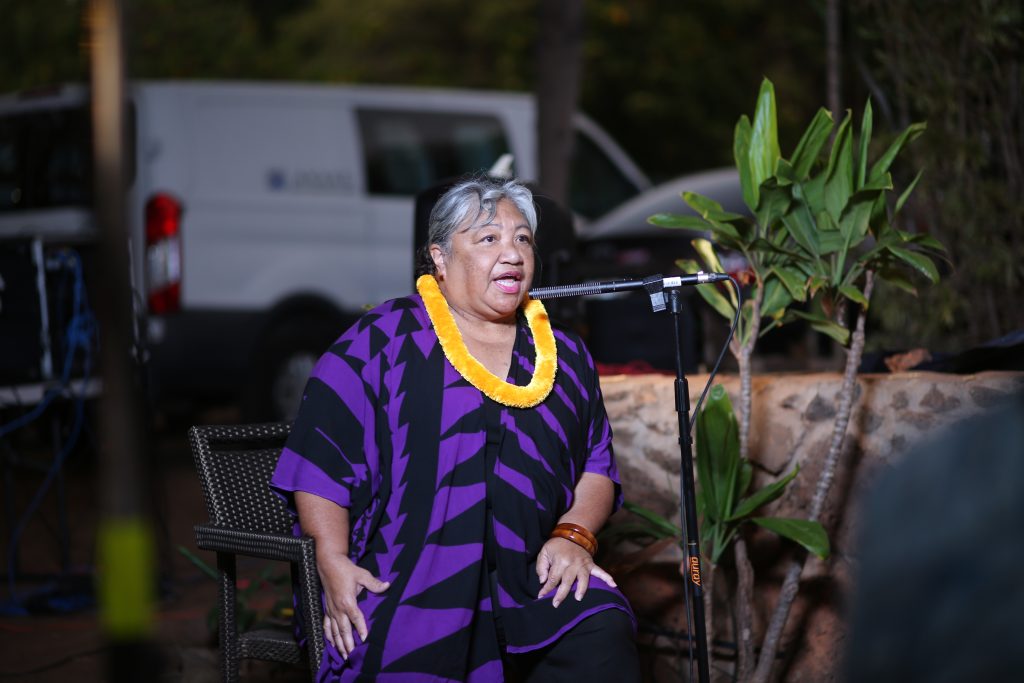
Kahului
Incumbent Tasha Kama was not present at the forum. Carol Lee Kamekona answered the questions on affordable housing plans, her opinion on rent stabilization and a moratorium on new visitor accommodations.
Carol Lee
To address affordable housing, there’s already a good blueprint in place, Lee said. The council approved a Comprehensive Affordable Plan from 202, but there are many parts that have yet to be implemented.
Lee also said she believes in rent stabilization. Families need to not only survive but thrive, Lee said. They should be able to take their children to the movies or out to eat.
“What FEMA did to our people is an utter disgrace. Who can afford $5,000 for a studio? Who can afford $11,000 for a two-bedroom home. None of us can. Those of us who have to work two and three jobs in a two income household? Come on.”
Lee also believes Maui shouldn’t build any more accommodations for visitors. She wants to convert short term rentals into long term housing and restrict water usage. The Grand Wailea hotel uses over 600,000 gallons of water a day, she said.
“We don’t need to be building any more accommodations for them. We need to take care of our people now.”
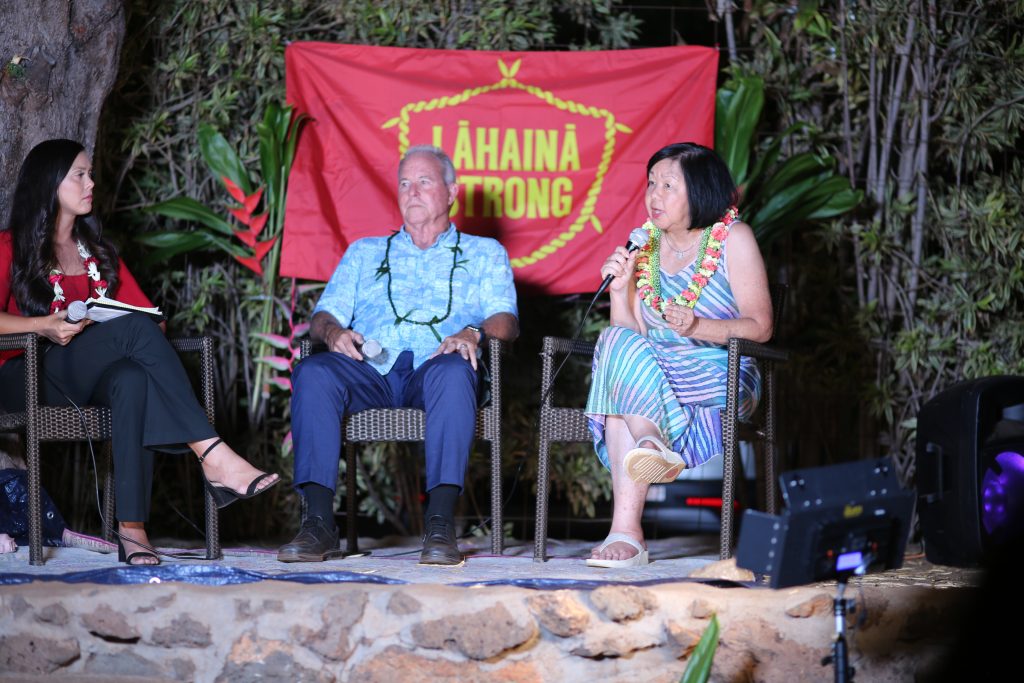
South Maui
Incumbent Tom Cook and challenger Kelly King discussed how they would allocate R-1 water, short term or Minatoya units and undergrounding electrical utilities.
Tom Cook
Cook addressed criticisms about a resolution he introduced using R-1 water for construction. Some questioned the way he referred to water as a “valued commodity” instead of a public trust resource and found issue with the way he wanted to use the water for construction but did not specify what type of construction. Cook said he would use the resources “intelligently,” that he wants to use the water for local residents and that he does not intend to use it on luxury developments.
Minatoya units are a list of thousands of short-term rentals in Maui zoned in residential areas. Advocates say converting Minatoya units into long term housing they are zoned for is the fastest affordable housing that could come online for Maui’s residents.
But Cook said he wants to keep the Minatoya units commercial to keep the money flowing on Maui. Instead, he would like to switch the zoning from residential to commercial and update the properties so people will want to stay in them.
“I’d like to pivot away from tourism being the primary economic engine, but we need to do just that. We need to pivot. We can’t just abandon ship.”
Cook said the best thing the county can do for housing is to reduce wait time for permitting so people can build.
After official reports found a downed powerline sparked the Lahaina fires, residents have advocated for moving these power lines underground so they’re less vulnerable to wind and extreme weather.
When asked about undergrounding electric utilities, Cook said he is in favor of undergrounding utilities, but he’s not sure because it’s a long process that would slow the reconstruction of homes and would also have potential negative cultural impacts drilling through the ground of the former Hawaiian Kingdom capital.
Kelly King
King said Maui needs a prioritization policy that says water should be used first for affordable housing. King also wants water to be a public trust and envisions a separate water authority for West Maui, Central Maui and Wailuku Water Company.
King said her mind is open to converting Minatoya units. She said she would like to see the county work identify which units are affordable and work with FEMA to buy the units and keep the condos affordable.
“I’m totally open to that. I don’t like the way the proposal was made for which ones to convert and how to convert them.”
But she’s not in favor of converting them all because many are extremely old and need updates. The old units, King said, could become stranded assets that hotels will want to build on. Stranded assets are properties that become liabilities because they lose too much value.
King added that she opposes the Ledcor development in South Maui, saying the 900 luxury homes will drive up prices in the area. She also supports underground utilities and thinks residents shouldn’t have to pay for it since they’re putting extra power into the grid.

WEST MAUI
Incumbent Tamara Paltin spoke about policies to help business owners, keeping Lahaina safe from disaster tourists and crime, and addressing the imbalance in resource allocation that favors luxury developments. The challenger Lorien Acquintas was not present.
Tamara Paltin
Paltin said she is thinking about leasing the parking structure in the outlet mall space so local businesses can do commerce there. This would happen about 6 or 7 months out, because there is concern bringing people into the burn zone.
Responding to questions about safety, Paltin said some of her ideas included a locked shed program where kids from schools built sheds for residents to keep their supplies in. She is also talking to security companies about the possibility of donating motion sensor lights. Paltin also wants to work with FEMA to put up temporary structures as they rebuild.
There are huge affordable housing projects in West Maui, over 50% affordable, but they’ve been on the books for decades and they’re not moving forward, Paltin said. And more plans have started after the fire, but she’s not sure when they will be happening. Critical to building this housing is water, and affordable housing needs to be given the full allocation of water that it deserves.
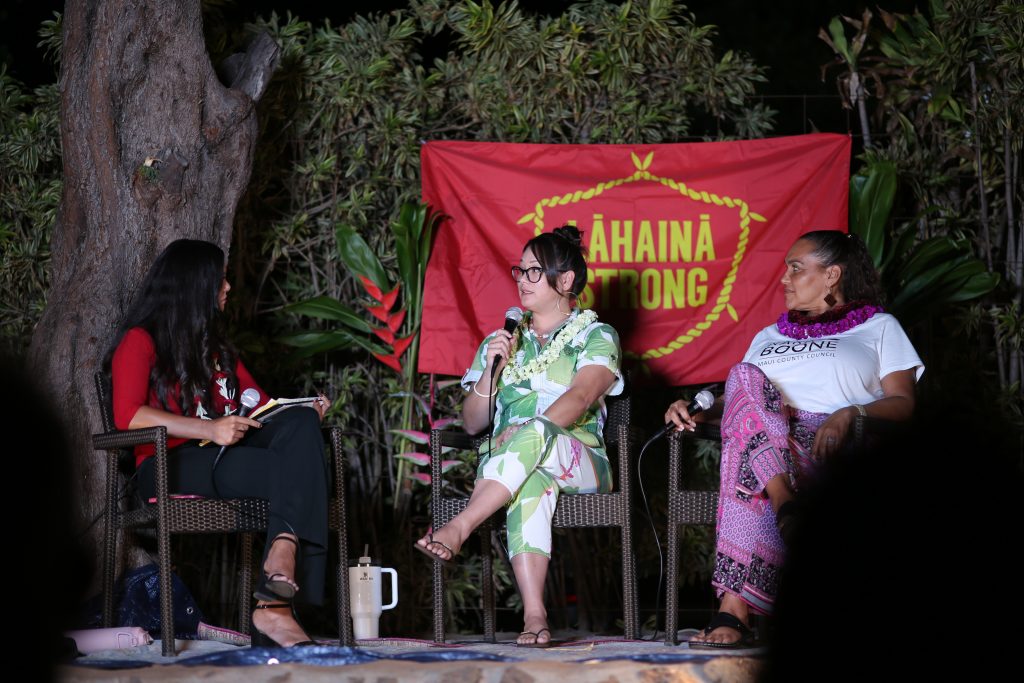
Paia – Makawao – Haiku
Incumbent Nohe U’u-Hodgins and challenger Nara Boone discussed fire-proofing their communities, their steps to address Maui’s housing crisis and their opinions on rent stabilization.
Nohe U’u-Hodgins
U’u-Hodgins said she talks about fire prevention all the time with her family, friends and constituents. She will be hosting a town hall in Makawao, and she created park hours in Holomua Road to keep families safe. She also wants to ensure access to radio.
To address Maui’s housing market, U’u-Hodgins said we need more affordable housing, access to affordable housing and infrastructure that comes with it. She said she helped create affordable housing in her previous job, and she is working with the prosecutor’s office to figure out where the gaps are in resources. She wants to put together a housing summit where Maui’s nonprofits and agencies discuss what people need.
U’u Hodgins isn’t sure about the rent stabilization proposal currently in front of the council. She said all options need to be weighed so it’s a balanced policy.
Nara Boone
To make Maui more fire safe, Boone wants to upgrade infrastructure. There’s a faulty pole in Makawao specifically that she would like to fix. She also hopes to reverse U’u-Hodgins’ “park hours,” which locks gates on important fire escape routes.
Boone said the county needs to stop homelessness sweeps. She wants safe spaces back, like the campgrounds formerly at Ho’okipa, Baldwin and Makena beaches. She likes the director of housing’s idea for the county to purchase land, lay down the infrastructure, then take bids for affordable housing with priority to locals. She also supports deed restrictions, the idea that owners cannot sell or rent a property unless it’s to a long term resident.
Boone doesn’t support the proposed rental freeze. Instead, something needs to be done to bring the prices down.
“This idea of a rental freeze right now is unrealistic when most of us can’t pay for the rents that are happening,” she said. “The majority of the rent increases that have happened are completely illegal. What I would like to see is some kind of regulation and some kind of enforcement for that.”
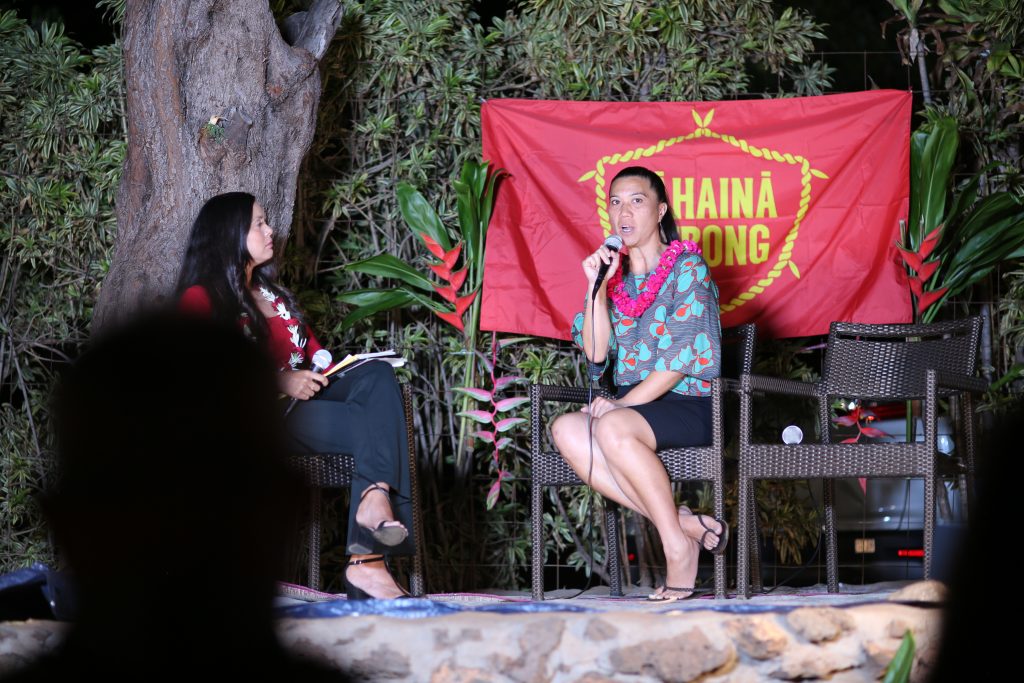
Moloka’i
Incumbent Keani Rawlins-Fernandez discussed phasing out short term rentals, preserving Lahaina’s culture amidst economic recovery and responded to a survey saying Maui’s county council did a poor job facilitating Lahaina wildfire recovery. Challenger John Pele was not present.
Keani Rawlins-Fernandez
Rawlins-Fernandez said she supports the mayor’s bill to phase out short term rentals because it is necessary to reclaim housing units for local residents. As a former lawyer, Lahaina Strong asked Rawlins-Fernandez if the county should be deterred by potential lawsuits that would come up from switching these short term rentals into long term housing. But she said the county shouldn’t be deterred by lawsuits when they’re doing the right thing.
As the representative from Moloka’i, Rawlins-Fernandez said she refuses to supersede the people’s interests to outside investors, as she’s seen happen on Maui. She hopes to see more voter turnout to protect the island’s culture.
While a Honolulu Civil Beat survey showed residents were dissatisfied with the council’s response to Lahaina’s wildfires, Rawlins-Fernandez said she believes these results are skewed since the poll takers are mostly Civil Beat’s readership, and the news outlet was often critical of the council, at times mixing up their responsibilities with the administration.
But there is more council members can be doing, Rawlins-Fernandez said, to build trust and accessibility. Councilmembers should be talking story with constituents, attending events wherever possible and working together with community groups shoulder to shoulder in the trenches.
“I’m a community organizer at heart, and I’m so inspired by all the leaders of Lahaina Strong,” Rawlins-Fernandez said. “The work that you all are doing reminds me of myself ten years ago just wanting to do good for our people. You know what my priorities are because my priorities are your priorities and I’m right there with you in our community, in the trenches, the literal trenches, digging sand with you, sleeping in the tents with you, and that’s where I’ll continue to be, in the trenches shoulder to shoulder with you.”
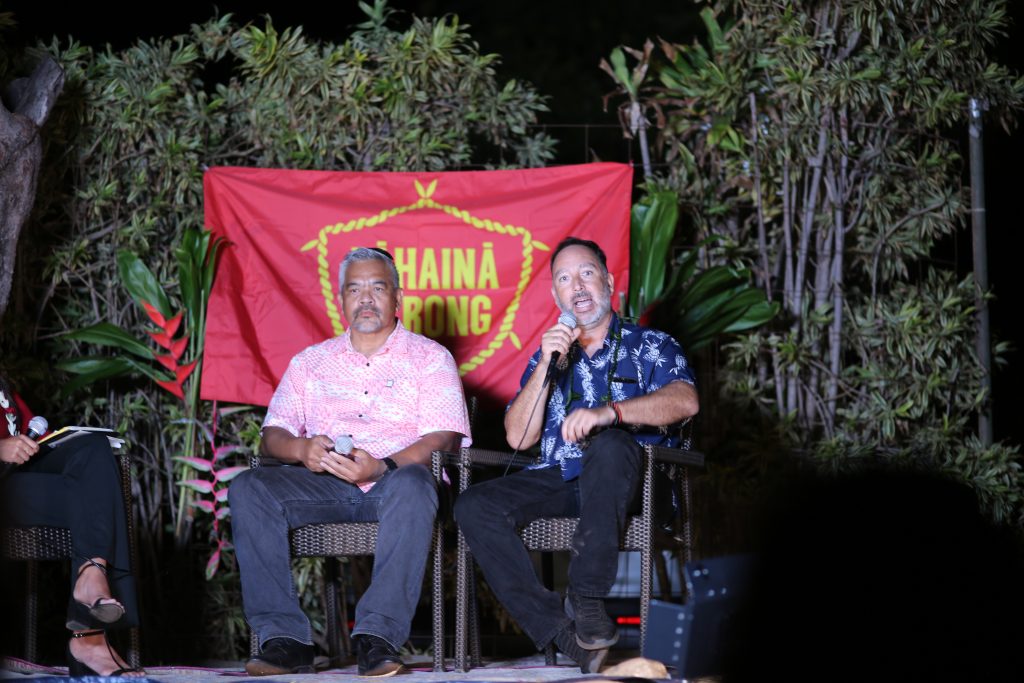
Hana & Lana’i
The councilmembers for Hana and Lana’i are running unopposed. But they still stopped by to offer their opinions on water, housing and Lahaina’s rebuild.
Shane Sinenci
The incumbent Hana councilmember said water is a public trust and we need to go back to the Hawaiian kingdom days where Lahaina was the Venice of the Pacific to make plans for the future. He also said housing was also supposed to be a condition of statehood, but Hawai’i has yet to see that. He is glad the state legislature put in $600 million to develop Hawaiian homelands. But it’s going to take about five or more years to build Lahaina and he’s looking to see how to appropriate housing funds in the budget over the next few years to keep the rebuild affordable.
Gabe Johnson
Johnson is the Chair of Affordable Housing and said the county needs to fully implement the Affordable Housing Plan in 2021. He talked about Bill 111 as an example, which gives long term residents a priority in housing and provides a lottery system ranked by the amount of years one has lived on Maui. The bill was passed but has yet to be enforced.
As the chair, Johnson also passed a bill that says developers can’t charge you more than 30% of your income for mortgage. Johnson also advocates for purchasing lands that the county can develop and protect. The county should not be driven by profit, but service, Johnson said.
Johnson also believes water is a public trust, but the county needs to start putting its money where its mouth is and make that happen. Lana’i is 98% owned by a billionaire and the water is owned by a private company. That’s not actually public, he said, and he believes the county should purchase private water companies to give power to the people.Voters can watch the full forum on Youtube.
AsAmNews is published by the non-profit, Asian American Media Inc.
We’re now on BlueSky. You can now keep up with the latest AAPI news there and on Instagram, TikTok, Facebook, YouTube and X.
We are supported by generous donations from our readers and by such charitable foundations as the Robert Wood Johnson Foundation.
You can make your tax-deductible donations here via credit card, debit card, Apple Pay, Google Pay, PayPal and Venmo. Stock donations and donations via DAFs are also welcomed.

